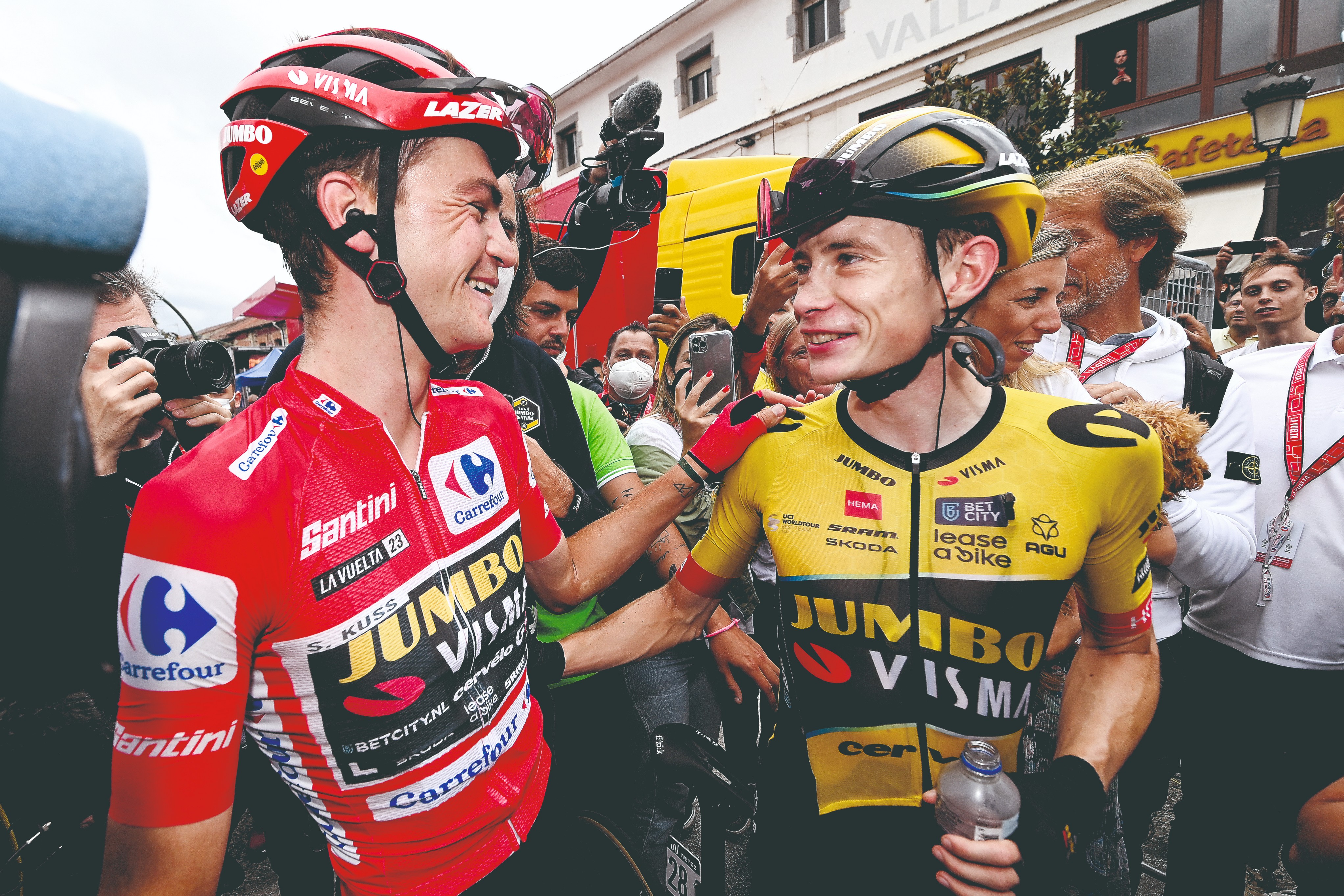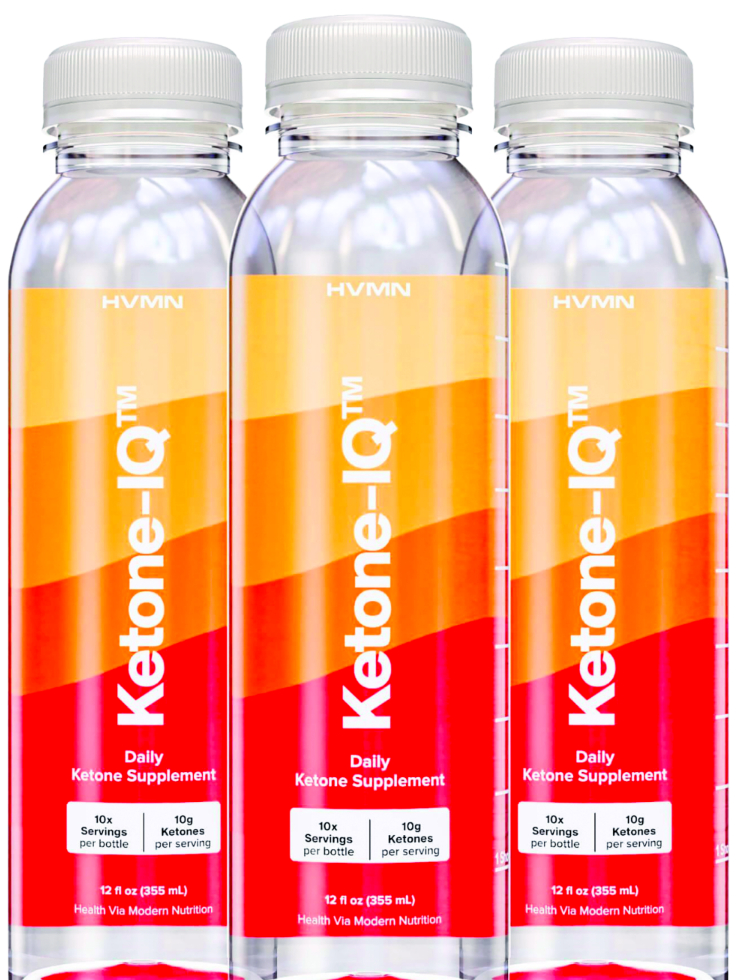What's the big deal about ketones?
As more and more pro teams go public about their use of ketones, Tom Thewlis examines the potential gains available to pros and amateurs willing to invest in the costly, controversial supplement


Cycling is so full of mind-boggling jargon that it almost threatens to spoil the fun sometimes. If it isn’t the intricacies of power measurement, it’s the physiology of fuelling or the PhD-level physics behind wind-cheating aerodynamics. The latest buzzword to get us grappling with its significance is ketones, described by some as a groundbreaking legal performance-enhancing supplement. More and more WorldTour teams are announcing partnerships with providers of the mysterious drinks, which are becoming hard to ignore. But what exactly are ketones and do they really live up to all the hype?
This much is clear: ketones have become ubiquitous among the pros, as I found out for myself at Paris-Nice in March. On several stages, as riders crossed the finish line, they grabbed coats, Haribo and, in some cases, ketones from waiting soigneurs before making their way back to their team buses.
Soudal Quick-Step were one of many teams seen using the drinks, and were active on social media during the race sharing videos of Remco Evenepoel guzzling sponsor KetoneAid’s products post-stage. As I witnessed this new phenomenon, a multitude of thoughts crossed my mind. Do the riders using these products really believe in their effectiveness and, on the flipside, do those not using them dismiss them as worthless?
A quick internet search revealed that DeltaG, the ketones used by Mathieu van der Poel's Alpecin-Deceuninck team, were developed at Oxford University, just down the road from where I live. A few emails later, and I was on my way to meet the scientists behind the drinks. I wanted to break down the wall of secrecy surrounding ketones to find out what the fuss is really all about.

Visma-Lease a Bike were early adopters of the supplement
Alternative fuel source
First, what are ketones? In short, they are a fuel produced naturally in the liver when the body breaks down fats, providing an alternative source of fuel when glucose availability is limited, such as during long rides. “There’s no human body that doesn’t have ketones present,” says Professor Kieran Clarke of Oxford University, ketone researcher and the brains behind DeltaG, one of several ketone brands used in cycling today. “Fat is broken down to ketones,” she explains, “which are very similar to glucose [molecules] and work in similar ways.”
The ketones used in supplements are ketone esters, a synthetic compound that consists of a ketone group bonded to an ester group. In theory, by taking these exogenous ketones, in drink form, athletes are providing themselves with an extra fuel source alongside their glucose reserves, to ensure they can go the distance in long, arduous events. However, the Movement for Credible Cycling (MPCC) group, which includes Groupama-FDJ, Confidis and Bora- Hansgrohe, among others, prohibits its member teams from using exogenous ketones. Given that ketones are produced naturally, why the scepticism? “ The UCI says it is investigating the long-term effects of ketone use on health,” MPCC chair Roger Legeay tells Cycling Weekly. “We want to wait to see the results of the investigation.”
Hold Your Nose: Taste Test
In a social media clip after the recent Flèche Wallonne, Soudal Quick-Step’s Ilan van Wilder was pictured holding his nose while drinking a bottle of KetoneAid at the finish line. Having recently tried ketones for myself, I understood why – the taste is awful.
Trialling ketones to monitor their effect on my own performance, I was instantly put off by what can only be described as a bitter, metallic taste. The DeltaG product I tried was listed as being blueberry flavour, but it was enough to put you off blueberries for life.
Javier Gonzalez believes that the bad taste is part of what has generated question marks around ketones’ legitimacy. “The bad taste adds to the mystique around ketones. People think, ‘Oh, this tastes awful, it must be doing something really potent’ so I think it’s probably partly that.”
The MPCC’s stance is hardly surprising, particularly as ketones first involvement in cycling stirred up such high-profile controversy. This was at the time of the London 2012 Olympic Games, when it was still not known whether the substance might breach anti-doping laws. A report in the Mail on Sunday in 2020 revealed that DeltaG was covertly tested by some of Great Britain’s top riders in the build-up to the games in a testing programme sanctioned by UK Sport. According to Sporting Intelligence, the product was not medically approved at the time, and yet 91 guinea pig athletes from a variety of sports signed non-disclosure agreements stating that if they fell ill from using the product, they would not discuss what they had been taking with those outside of the programme. The Mail on Sunday report stated that, if discovered, the plan was to portray the scheme as GB simply being ahead of the curve in terms of marginal gains development.
Get The Leadout Newsletter
The latest race content, interviews, features, reviews and expert buying guides, direct to your inbox!
Research into ketones has progressed significantly since then, and they are not currently banned by the UCI, the World Anti Doping Agency (WADA) or the International Olympic Committee [IOC]. Clarke tells me that exogenous ketones were initially produced at Oxford University at the request of the American Department of Defence. The US military’s hope was that ketones would give troops an extra edge and help them stay fuelled for longer when operating on low rations behind enemy lines and during combat.
Visma’s view
In cycling, ketones are no longer regarded principally as a fuelling product but rather as an aid to recovery, as Martijn Redegeld, head of nutrition at Jonas Vingegaard’s Visma-Lease a Bike team explains. “I think the whole buzz around ketones started five or six years ago,” he says.
“There were two different reasons for using them, one was more focusing on the acute performance benefits, meaning riders needed to take ketones shortly before or during a race; the other area was more focusing on recovery purposes and training adaptational responses. I think over the last few years, research has shown the most promising effects in that secondary area, on the recovery side.”

Ketone is reported to enhance your sleep
Cycling Weekly contacted other WorldTour teams to discuss the use of ketones but received no reply. Some teams acknowledged their use of ketones but refused to talk about why. Professor Clarke says that research is revealing that ketones have the power to increase cognitive performance as well as providing a boost on a physical basis. However, Visma’s Redegeld isn’t yet sure of the cognitive benefits. “That’s one area research is focusing on, but to be honest, I think that part is still pretty unexplored,” he says. “The evidence so far is anecdotal. What is clear is that ketones are more than just a fuel. In the beginning, it was felt that they were just like carbohydrates, just an extra fuel, but now we know they can be seen as a signalling molecule that triggers all kinds of other processes in the body.”
Overnight Ketones: Sleep Booster

If you can get past feeling nauseous upon consumption, ketones are reported to enhance your sleep and quickly have you napping like a pro. Professor Gonzalez explains why: “They seem to potentially have some effect on the balance of hormones including norepinephrine,” he explains, “which might have a direct effect on sleep, but ketones may also affect sleep indirectly because they also reduce urine output. So if you have a ketone ester, you don’t need to go to the toilet as much, which might mean you don’t wake up in the night needing the loo.”
Researchers at universities across the world continue to explore the benefits and side effects of ketones. One stumbling block is cost: exogenous ketones are so expensive that it can be difficult to get research projects signed off. “Some of the ketones studies we’re interested in doing are long-term, supplementing people with them for weeks, but the cost then skyrockets and it’s difficult to fund,” says Javier Gonzalez, professor of human metabolism at Bath University. “ This is the reason why we currently haven’t got any projects on the go on ketones.”
It’s also for cost reasons that Gonzalez believes amateurs are better off spending their money on other forms of performance enhancement. “I do think the cost-benefit ratio [from ketones] is small,” he says. “Even if they do enhance performance, there are probably other, cheaper things that give you a bigger bang for your buck, at least based on what we currently know.”
As an example, the DeltaG ketone drink is available in boxes of three, with the most expensive retailing at £75 per box.
Believers and sceptics
Redegeld echoes Gonzalez’s view regarding the cost, and says that while amateurs could see benefits from the use of the product, he would recommend making changes elsewhere first. “My advice is always for the amateurs to start with getting the basics right,” says the Visma nutritionist. “Just meeting your energy needs, getting good calories in, and the right amount of carbohydrates, will give a much bigger benefit. But I think for an ambitious amateur who does all of these things correctly, ketones can for sure be an extra.”.
Like Visma-Lease a Bike, UAE Emirates – the team of two-time Tour champion Tadej Pogačar – are not part of the MPCC so would be able to use ketones freely. It’s interesting, then, that UAE riders are advised against using them. Outspoken sports scientist Iñigo San Millán, the head of performance on Pogačar’s team, is not convinced. “We know that the best fuel for the contracting muscles during high performance exercise is glucose and also lactate,” he tells CW. “Ketones are there as an extra fuel. Yes, that extra fuel works, but it’s a poorer, lower-quality fuel compared to carbohydrates. This is why if an athlete asks me whether they should have carbohydrates or ketones, it’s always carbohydrates. We always try to educate them and explain why having ketones during competition could be detrimental.”
Ketones are not banned at UAE, but San Millán explains to riders that there are better alternatives. What about the purported recovery benefits? “For a recovery drink or formulation, I always will stick with carbohydrates and proteins, rather than ketones. In my opinion, ketones are a low-grade fuel,” says San Millán.
Unlike for university researchers, it’s not budgetary constraints that deter UAE Emirates from using ketones. “Sometimes athletes have asked us, ‘Is the team going to be supplying these ketones?’ The answer is no, and the reason is because we don’t believe that they’re necessary,” he explains. “In my humble opinion, there are better ways to be effective with your nutrition.”
With highly qualified scientists such as San Millán writing off the effectiveness of ketones, it’s hard to understand the faith placed in them by some teams – particularly as they are unwilling to discuss their rationale. Cycling’s murky past means that any alleged new performance- enhancing substance is bound to raise suspicion. Amateur riders, however, would have to be very convinced of the benefits of ketones to regularly shell out £75 on a drink offering, at best, a marginal gain.

Thank you for reading 20 articles this month* Join now for unlimited access
Enjoy your first month for just £1 / $1 / €1
*Read 5 free articles per month without a subscription

Join now for unlimited access
Try first month for just £1 / $1 / €1

Tom has been writing for Cycling Weekly since 2022 and his news stories, rider interviews and features appear both online and in the magazine.
Since joining the team, he has reported from some of professional cycling's biggest races and events including the Tour de France and the World Championships in Glasgow. He has also covered major races elsewhere across the world. As well as on the ground reporting, Tom writes race reports from the men's and women's WorldTour and focuses on coverage of UK domestic cycling.
-
 'I have been ashamed for days' - Man who threw bottle at Mathieu van der Poel at Paris-Roubaix apologises
'I have been ashamed for days' - Man who threw bottle at Mathieu van der Poel at Paris-Roubaix apologisesIn a letter to Belgian newspaper Het Laatste Nieuws, the assailant apologised for his action on Sunday
By Adam Becket
-
 Meet Tadej Pogačar's new weapon: Colnago’s lightest frame ever — the all-new V5Rs
Meet Tadej Pogačar's new weapon: Colnago’s lightest frame ever — the all-new V5RsParis-Roubaix was the last hoorah on Colnago’s winnigest bike, the V4RS. Enter the new V5Rs, to be raced from the Amstel Gold Race onward
By Anne-Marije Rook